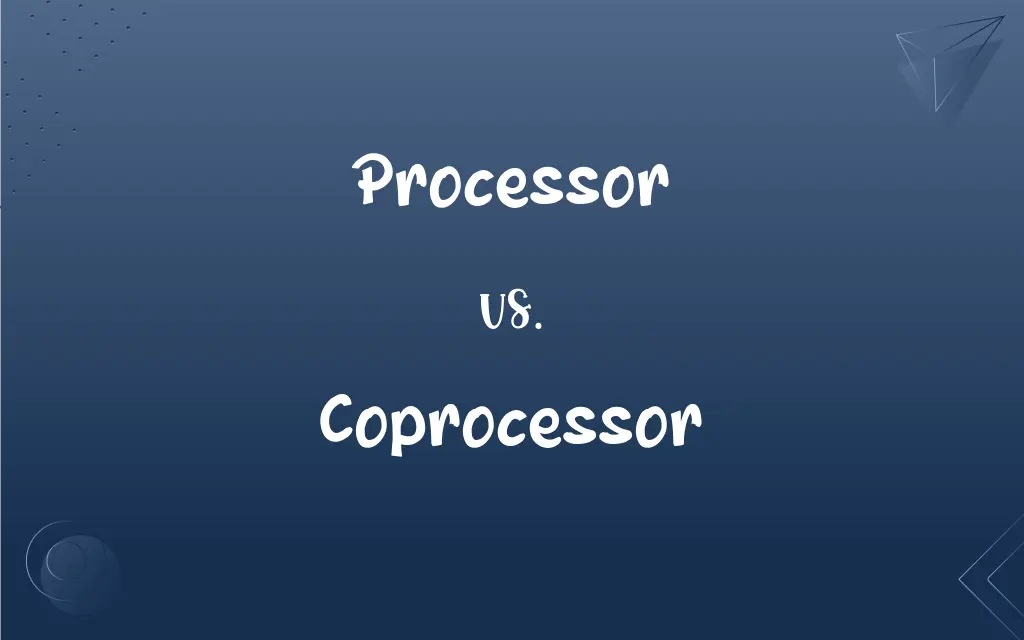Processor vs. Coprocessor: What's the Difference?
Edited by Aimie Carlson || By Janet White || Published on December 8, 2023
A processor is the central unit that performs core computing tasks, while a coprocessor is a secondary processor designed to support the main processor by handling specific functions.

Key Differences
The processor, often referred to as the central processing unit (CPU), is the primary component of a computer that executes instructions. In contrast, a coprocessor works alongside the processor, handling specialized tasks to enhance overall performance.
Processors are designed for general-purpose computing, performing a wide range of tasks. Coprocessors, on the other hand, are tailored for specific operations like graphics processing or mathematical calculations.
Every computer requires a processor to function, as it's the core of computational operations. A coprocessor is an optional addition that can improve efficiency in certain tasks, but isn't essential for basic computer operation.
The speed and efficiency of a processor are crucial for the overall performance of a computer. Coprocessors, while enhancing performance in specific areas, depend on the main processor to coordinate overall computing tasks.
Processors are versatile and handle a variety of tasks, from running applications to managing system operations. Coprocessors, in contrast, are often dedicated to tasks like floating-point calculations, thereby easing the load on the main processor.
ADVERTISEMENT
Comparison Chart
Function
Executes core computing tasks
Supports processor with specialized tasks
Necessity
Essential for computer operation
Optional, enhances specific functions
Task Range
General-purpose, wide range of tasks
Specialized, focused on certain operations
Independence
Operates independently
Works in tandem with the main processor
Impact on Performance
Central to overall system performance
Improves efficiency in specific areas
ADVERTISEMENT
Processor and Coprocessor Definitions
Processor
A processor is the brain of a computer, executing instructions and operations.
The processor ensures that all your applications run smoothly.
Coprocessor
It's designed to handle specialized computational tasks.
Mathematical coprocessors speed up complex calculations.
Processor
It's the central unit in a computer for performing computations.
A faster processor can significantly speed up your computer.
Coprocessor
A coprocessor is a secondary processor that assists the main CPU in specific tasks.
A graphics coprocessor enhances video rendering.
Processor
A key component in both computers and smartphones, handling data processing.
Modern processors are capable of multitasking efficiently.
Coprocessor
Coprocessors offload certain tasks from the main processor.
A coprocessor can handle audio processing in a computer.
Processor
Processors interpret and carry out software instructions.
Gaming requires processors with high processing power.
Coprocessor
Often used in systems requiring high-performance in specific areas.
Advanced graphics workstations include a dedicated coprocessor.
Processor
Processors manage and execute all computational tasks.
Upgrading the processor can improve overall system performance.
Coprocessor
Coprocessors are tailored to improve efficiency in certain functions.
A physics coprocessor boosts performance in physics simulations.
Processor
One that processes, especially an apparatus for preparing, treating, or converting material
A wood pulp processor.
Coprocessor
A microprocessor that performs specialized functions that the central processing unit cannot perform or cannot perform as well and as quickly.
Processor
A computer.
Coprocessor
(computer hardware) An additional microprocessor used to supplement the functionality of the central processing unit, performing tasks such as floating-point arithmetic (floating-point unit) or graphics calculations (graphics processing unit).
Processor
A central processing unit.
FAQs
What does a coprocessor do?
Assists the main processor by handling specific, specialized tasks.
Is a coprocessor necessary for a computer?
No, it's optional but can enhance performance in certain areas.
Can a computer run without a processor?
No, a processor is essential for a computer's operation.
What is a processor?
The main unit in a computer that executes instructions and operations.
Are coprocessors used in all computers?
Not in all; they're used in systems requiring enhanced specific performance.
How do processors and coprocessors work together?
The coprocessor takes on specialized tasks, easing the load on the processor.
What types of tasks does a coprocessor handle?
Specialized tasks like graphics processing or complex calculations.
Can a coprocessor replace a processor?
No, it's designed to complement, not replace, the main processor.
Can you upgrade a processor?
Yes, but it depends on the computer's motherboard and compatibility.
What's the difference between a processor and a microprocessor?
A microprocessor is a type of processor used in personal computers.
What is a graphics coprocessor?
A specialized coprocessor designed for handling graphics tasks.
How does a processor affect gaming performance?
A powerful processor ensures smoother and faster gaming.
How does a processor impact a computer's speed?
It's central to the computer's overall performance and speed.
What is a floating-point coprocessor?
It's a coprocessor designed to handle floating-point calculations.
Is a coprocessor useful for data science?
Yes, especially for tasks requiring high computational power.
What is the role of a processor in a smartphone?
It performs all computational tasks, similar to a computer.
How do processors evolve over time?
They become faster, more efficient, and capable of handling more tasks.
Can a coprocessor be integrated into the main processor?
Yes, some modern processors integrate coprocessor functionalities.
Do smartphones have processors?
Yes, they have processors to manage and execute tasks.
Are coprocessors common in laptops?
They are found in some high-performance laptops.
About Author
Written by
Janet WhiteJanet White has been an esteemed writer and blogger for Difference Wiki. Holding a Master's degree in Science and Medical Journalism from the prestigious Boston University, she has consistently demonstrated her expertise and passion for her field. When she's not immersed in her work, Janet relishes her time exercising, delving into a good book, and cherishing moments with friends and family.
Edited by
Aimie CarlsonAimie Carlson, holding a master's degree in English literature, is a fervent English language enthusiast. She lends her writing talents to Difference Wiki, a prominent website that specializes in comparisons, offering readers insightful analyses that both captivate and inform.







































































